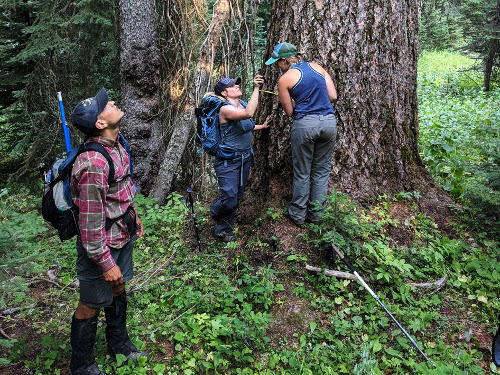SUBSCRIBE TO THE FREE NEWSLETTER
Unlocking the secrets inside Cascadia’s trees
Tree coring is difficult and finicky work: getting a good sample is hampered by moisture, rot, and insects. But the data gathered is essential in documenting how forests in Cascadia have adapted to wildfire, drought, and insects over centuries– and how human impacts are changing all that.
In a lyrical feature, “Coring the Trees,” now online at Cascadia Magazine, Portland-based writer Paul Lask describes a week spent with an all-female crew coring trees in the Blue Mountains of Oregon. Amid a cast of kick-ass women, Lask learns about the flora and fauna of the region, as well as this unique research project that’s shedding light on the effects fire suppression and climate change are having on the ecology of the Inland Northwest’s forests.
It’s a story packed with details of life and work in the woods:
“The shaft sank deeper as I turned the handle. The sound was something like a rooster being strangled. It needed to go deep enough to reach the pith, the central dot the rings grew around.”
Head over to Cascadia Magazine and read the full feature online this weekend.
And if you appreciate great writing like this, please consider becoming a supporting reader of Cascadia Magazine and visiting our donate page. We rely on the generous financial support of our readers to continue publishing articles on issues important to the Pacific Northwest. Thanks!
More on court’s rejection of Trans Mountain pipeline
The Vancouver Sun has more on yesterday’s stunning court decision that rejected the $9.3 billion expansion of the Trans Mountain pipeline across British Columbia — the court found the Canadian government had failed to adequately consult First Nations nor to realistically assess the impact of increased tanker traffic on the Salish Sea. Ricochet Media looks at the ruling language (“The Order in Council is quashed, rendering the certificate a nullity.”) and National Review has reaction from First Nations, including Stewart Philip, grand chief of the Union of BC Chiefs: “The future of our grandchildren depends on our ability and courage to stand up and defend the land and the water. That’s what we’re seeing unfold here.”
Feds making creation of Seattle safe injection site difficult
The Seattle Times reports that Trump’s office of the attorney general is threatening severe legal action if the city and King county go forward with plans to create a supervised injection site for opioid drug users. In related news, the BC government is joining the state of Washington and the city of Portland in suing drug manufacturers for deceptive marketing that fueled the current opioid drug crisis. For more on how supervised injection sites save lives, read Kelsey Hamlin’s feature online at Cascadia Magazine.
High rates of sexual assault among Indigenous women
Last week, a report from the Urban Indian Health Institute found that an incredible 94 percent of Indigenous women interviewed in Seattle had either been raped or had coerced sex. Seattle Weekly follows up with a feature that looks at steps to address the crisis, including increased funding for enforcement of the Violence Against Women Act.
The end of single-family zoning in Vancouver?
Christopher Cheung, writing for The Tyee, looks at a major shift in Vancouver city politics: many candidates for mayor and city council, facing a housing affordability crisis, are calling for radical zoning changes that would allow apartments and other multi-family housing in most parts of the city. Meanwhile, former mayoral candidate Patrick Condon urges shifts in Vancouver spending to generate half a billion dollars in money for publicly-funded housing.
Herring recovery helping coastal BC First Nations
Hakai magazine has a great, detailed feature on how the recovery of herring is helping the Heiltsuk First Nation on the northern coast of British Columbia rebuild its traditions and restore damaged ecosytems.
Orphan Radio, Seattle pirate radio crossing boundaries
Seattle Met profiles the people behind Seattle’s Orphan Radio, a pirate radio station out of Georgetown that specializes in electronica and other experimental and international genres — in a way that’s shaking up the city’s music scene. Listen to Orphan Radio online here.
A life and death on opioids
The Walrus has an amazing and terrifying essay by Chris Willie, a British Columbian with a PhD in environmental physiology, an avid mountain climber, and an opioid drug user. The essay, completed not long before Willie died of a fentanyl overdose, is a brutally honest investigation of the author’s addiction and its relationship to his pursuit of extremes. “Motivation begins deep in the brain, where a neurochemical cauldron of past experiences, present morale, and future goals coalesce to stimulate a particular behaviour: I want that.”
An interview with Portland novelist Patrick deWitt
Patrick deWitt, the Portland-based novelist who was born on Vancouver Island, has a new novel: French Exit, and Electric Literature talks with him about the book and his writing style: “All of my books are measured out in the same way. Maybe 60% humor and 40% tragedy.”
That’s today’s selection of news, arts, and writing from across Cascadia. Enjoy your Labor Day weekend (or, if you prefer, your Labour Day weekend). We’ll see you again on Tuesday, –Andrew Engelson
Photo credits: measuring Douglas fir by Katya Davidson

